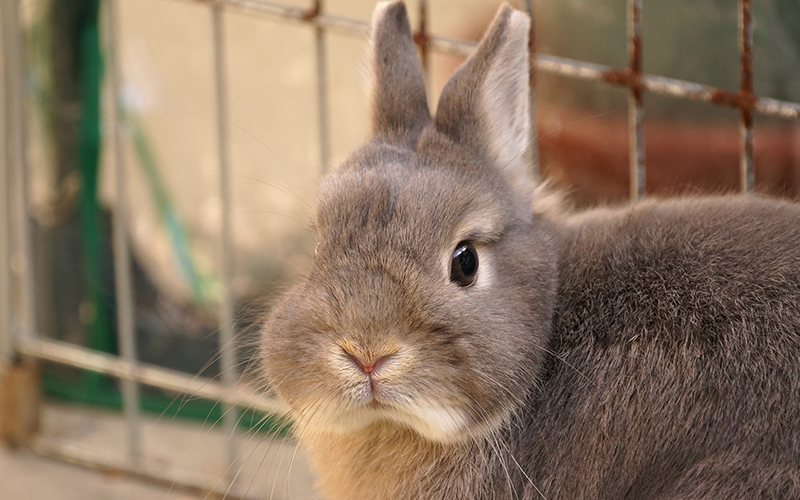
Bunny breeders and fanciers in Arizona agree that Easter can be a tough time on rabbits, who are picked up as holiday gifts or pets and then dumped shortly thereafter when people realize how much time is involved in caring for them properly. (Photo by Tjflex2/Creative Commons)
WASHINGTON – A 20-pound rabbit may sound like an Easter miracle to some kids, but for one Arizona petting zoo it’s just a safe business practice.
Farmer Doug’s Walking M Farms swapped its “little tiny bunnies” last year for Flemish giants, a bigger, more social breed of rabbit that is better able to cope with the unintentionally rough handling of children, who can snap a bunny’s spine if they pick it up the wrong way.
Arizona bunny fanciers agree that the danger to rabbits around Easter is great, and precautions need to be taken. But that’s about all they agree on.
Some will sell bunnies only to preapproved homes, some will rent instead of sell and some even refuse to rent a bunny. Kelly Ames is one of those who says there is no “safe” way to rent bunnies, to parties or in petting zoos.
“It’s an extremely bad idea,” Ames said. “Rabbits are a prey animal. They don’t like change, they don’t like to be picked up, they don’t like loud noise or to be chased.
“It’s a very stressful environment and rabbits can actually die from fear,” said Ames, executive director and co-founder of Tranquility Trail Animal Sanctuary.
For Tara Pool, owner of Tara’s Bunnies in Queen Creek, renting bunnies was just as stressful for her as it was for the animals. Pool stopped renting bunnies to photographers and birthday parties, saying it was “scary” because “bunnies are fragile.”
But Pool doesn’t mind selling bunnies if she’s sure they’re going to owners who know what owning a rabbit entails and how to care for it.
Pool reserves the right to refuse to sell to anyone she thinks is unfit to raise one of her animals. She does her best to ensure her bunnies go to families that fit the animal’s personality, and that the families are well-educated about the bunny’s needs.
She said she sells more bunnies at this time of year, not because of Easter but simply because there are more to sell in the spring. But she also knows that Easter is a time when unprepared buyers are looking for bunnies.
“I think it’s dangerous and I don’t think it’s the greatest idea to sell them around this time of year,” Pool said.
Pool said that after eight years in the business, she can usually trust her gut when it comes to bunny buyers. If her gut fails her, she tells buyers she will take any bunny back from a customer who can no longer care for it, so it does not end up in a shelter or released into the wild.
-Graphic by Kendra Penningroth
There might not be room at the shelters, anyway, said Kim Dezelon, Brambley Hedge Rabbit Rescue’s director of fundraising.
Dezelon said earlier this week that shelters in Arizona are already caring for about 500 abandoned, abused or hoarded rabbits, and they are running out of space. She said people who adopt rabbits as Easter presents do not understand that rabbits “have 10 times more work and attention required to them than any cat or dog.”
Dezelon said rabbits are almost never a good idea for children. But Brambley Hedge Rabbit Rescue takes extra precautions at this time of year with its annual Easter moratorium: It will not facilitate any bunny adoptions during the two weeks leading up to Easter.
Farmer Doug’s Walking M Farms does not sell any of its animals, but it does feature them in its petting zoo. Heather Tyner, one of the workers there, said employees take extra precautions to ensure the rabbits in their traveling programs are safe, making sure all children are seated when rabbits are wandering around the pen.
Tyner said they have had to turn down requests for the company’s “Bunny Petting Zoo” package, not because of Easter but because the weather has been too unpredictable – bunnies are very heat-sensitive. They have been able to get bunnies to their “Spring Themed Petting Zoos” – which feature bunnies, chicks and ducklings – on days when the weather has cooperated.
Instead of buying or renting a bunny, Ames recommends that interested families come to visit one for Easter.
Her Tranquility Trail Animal Sanctuary in Scottsdale will be open from 9 a.m. to 1 p.m. on Easter, just as it is every Sunday. Staffers will have information on rabbit lifespan, expenses and upkeep, and families will be able to purchase treats and toys to give to a bunny of their choosing.
Ames said her sanctuary never allows same-day adoptions and she will not adopt a bunny out to serve as an Easter gift. Any families that takes a bunny home near Easter does so because it started the process well ahead of time, volunteering at the sanctuary and getting well-educated on the needs of bunnies.
Ames said there is a “definite increase” in people looking to purchase or adopt bunnies around Easter that is invariably followed by “Easter dump season,” when more than 80 percent of bunnies bought for the holiday flood shelters and sanctuaries across the country.
“It’s important to be open around Easter to educate people,” Ames said, before reciting a mantra common in the business. “Bunnies are not Easter novelties, not an Easter toy … the best bunnies for Easter are chocolate bunnies, or stuffed bunnies.”